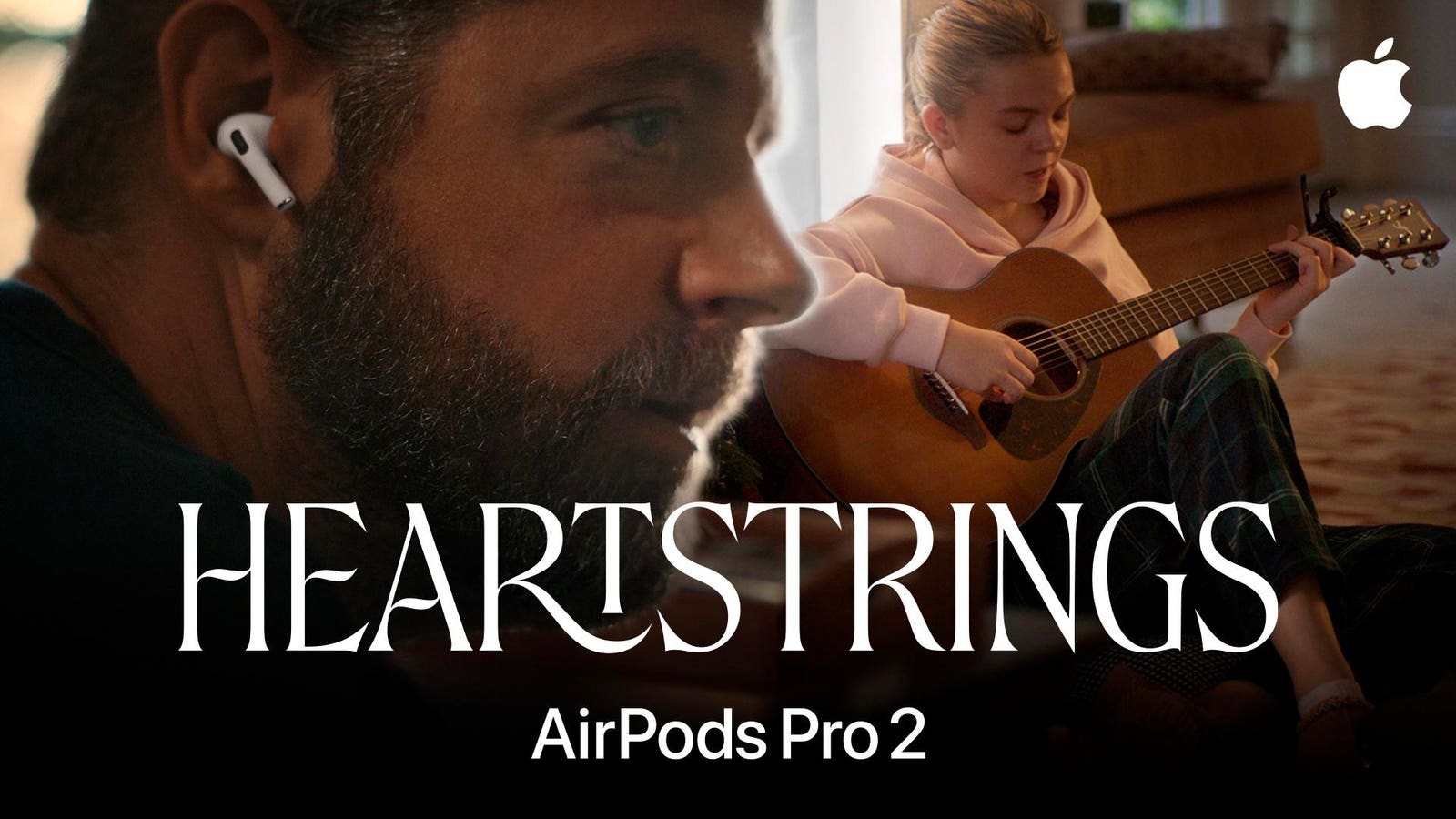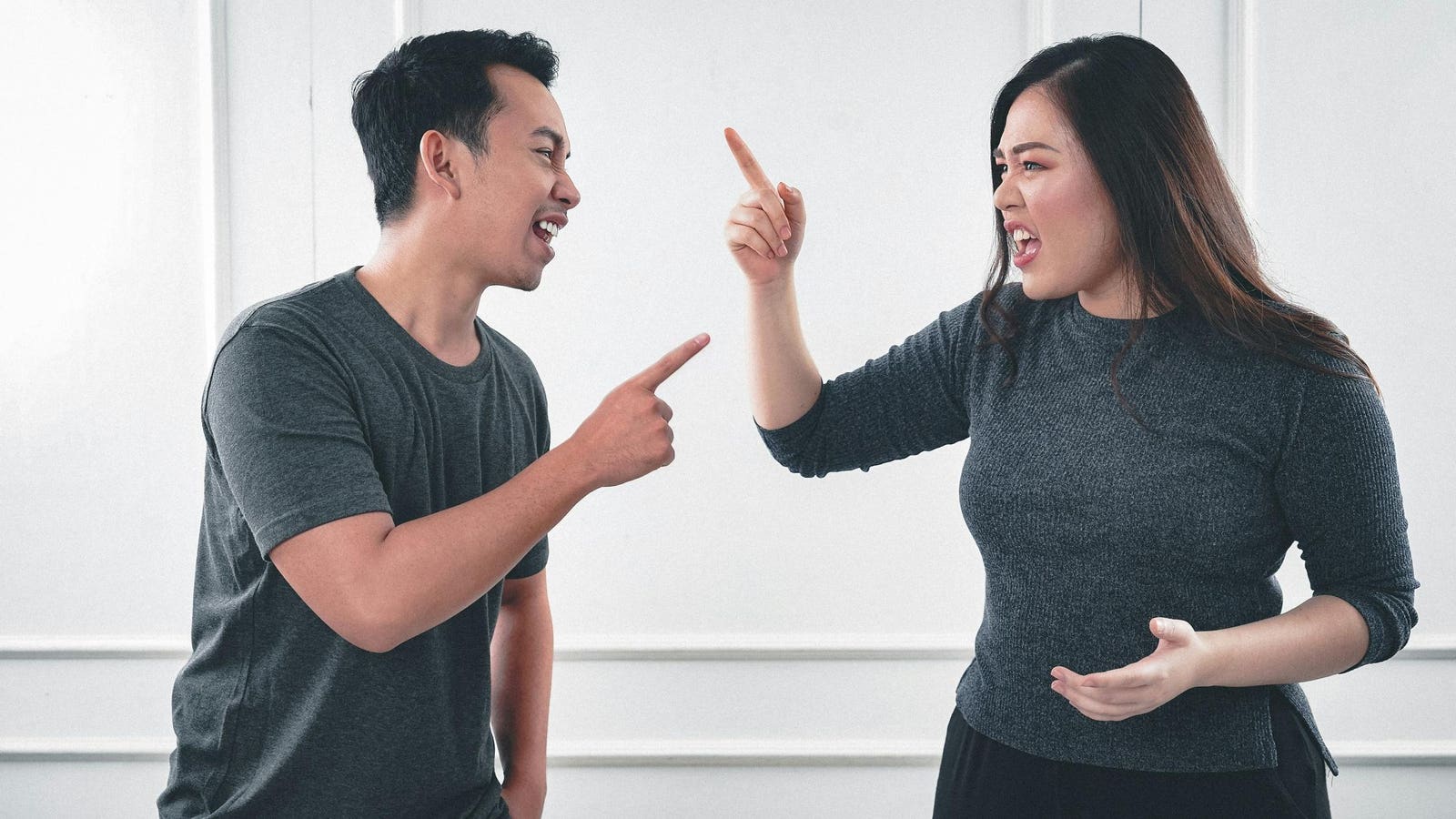Diversity and Inclusion (DEIA)
Sarah Herrlinger Talks AirPods Pro Hearing Aid

Apple’s Latest Holiday Ad Focuses on AirPods Pro and the New Hearing Aid Feature
The Power of Hearing Aid Technology
Before leaving for my family get-together on Thanksgiving, I posted an item about Apple’s annual holiday ad. Called Heartstrings, the new spot centers on a family celebrating Christmas morning and the father using the hearing aid feature on AirPods Pro to better hear his daughter serenade him with her acoustic guitar. The poignancy meter is off the charts as it shows Apple at its absolute best. Of course, the company surely hopes people are pushed to buy AirPods Pro, but the more salient point is that the earbuds have far greater resonance than merely being passive listening devices for music and podcasts.
A New Era of Hearing Aids
Thanks to the FDA and the commensurate iOS 18.1 software update released in late October, AirPods Pro have the ability to act as bonafide over-the-counter hearing aids for people who are dealing with mild-to-moderate hearing loss.
Apple’s Commitment to Accessibility
In a recent interview, Apple’s senior director of global accessibility policy and initiatives, Sarah Herrlinger, explained that the hearing aid feature in AirPods Pro is yet one more manifestation of the company’s "longstanding commitment" to the disability community vis-a-vis accessibility. She said there are 1.5 billion people worldwide coping with hearing loss, the severity of which is mostly on the mild-to-moderate side. Herrlinger added that Apple’s hearing study revealed 75% of people coping with hearing loss "do not get the assistive support they need."
The Hearing Aid Feature in Action
The hearing aid feature in AirPods Pro is designed to work "seamlessly" with the earbuds, which are "the best-selling headphones in the world" – the ones people reach for most often to listen to their favorite media. Apple figured why not combine their ubiquity with their "powerful foundation of the acoustic technology," along with the company’s institutional ethos on prioritizing accessibility and ever-burgeoning ambitions in healthcare, to "do something about the huge issue" around untreated hearing loss.
Designing for Accessibility
Herrlinger explained that Apple incorporates accessibility into "everything we do" because disability is part and parcel of the human experience. The company truly wants everyone to be able to use its products, she told me, adding it’s part of Apple’s mission to make technology that’s customizable so as to reflect the diverse needs of people.
The Future of Hearing Aid Technology
When asked about feedback, Herrlinger told me Apple "loves" hearing from its customers. The hearing aid function in AirPods Pro has been "no exception" in the weeks since iOS 18.1 dropped, the company has heard from users who have shared stories about how the functionality has "had an impact for a friend, family member, or in their own life."
Conclusion
Apple’s commitment to accessibility is evident in its latest holiday ad, which highlights the new hearing aid feature in AirPods Pro. The company’s dedication to making its products accessible to everyone is a testament to its mission to empower people to "live out their dreams."
FAQs
- What is the hearing aid feature in AirPods Pro?
The hearing aid feature in AirPods Pro is a new function that allows users to use their AirPods as hearing aids. - How does it work?
The hearing aid feature in AirPods Pro uses advanced audio technology to help improve hearing by amplifying sound and reducing background noise. - Is it available in all countries?
The hearing aid feature in AirPods Pro is available in over 100 countries and regions around the world. - How does Apple approach design for accessibility?
Apple incorporates accessibility into "everything we do" because disability is part and parcel of the human experience. The company truly wants everyone to be able to use its products, and it’s part of Apple’s mission to make technology that’s customizable so as to reflect the diverse needs of people.
Diversity and Inclusion (DEIA)
The Impact of Inclusive Leadership Training: A Guide to Developing Empathetic Leaders

With the rise of software and platforms for Diversity, Equity, Inclusion, and Accessibility (DEIA), organizations are now more than ever focused on creating a culture of inclusivity. In this guide, we’ll explore the importance of inclusive leadership training and its impact on developing empathetic leaders. From creating a welcoming work environment to promoting diversity and inclusion, these strategies will help you achieve your goals and maintain a positive workplace culture.
What is Inclusive Leadership Training?
Inclusive leadership training is a type of training that aims to equip leaders with the skills and knowledge needed to create a culture of inclusivity within their organization. This type of training focuses on promoting diversity, equity, and inclusion, and helps leaders to understand the importance of empathy and cultural competence. By providing leaders with the tools and resources needed to create a welcoming work environment, inclusive leadership training can help to improve employee engagement, retention, and overall job satisfaction.
Benefits of Inclusive Leadership Training
The benefits of inclusive leadership training are numerous, and can have a significant impact on an organization’s success. Some of the key benefits include improved employee engagement, increased diversity and inclusion, and enhanced reputation. By creating a culture of inclusivity, organizations can also improve their ability to attract and retain top talent, and improve their overall competitiveness in the marketplace.
Key Components of Inclusive Leadership Training
Inclusive leadership training typically includes a range of key components, including training on unconscious bias, cultural competence, and effective communication. Leaders may also receive training on how to create a welcoming work environment, and how to promote diversity and inclusion within their team. Additionally, inclusive leadership training may include opportunities for leaders to practice their skills and receive feedback from others.
Developing Empathetic Leaders
Developing empathetic leaders is a critical component of inclusive leadership training. Empathetic leaders are able to understand and appreciate the perspectives of others, and are able to create a culture of inclusivity and respect. To develop empathetic leaders, organizations can provide training on active listening, emotional intelligence, and cultural competence. Leaders can also benefit from opportunities to practice their skills and receive feedback from others.
Importance of Emotional Intelligence
Emotional intelligence is a critical component of empathetic leadership, and refers to the ability to understand and manage one’s own emotions, as well as the emotions of others. Leaders with high emotional intelligence are able to create a positive and supportive work environment, and are able to build strong relationships with their team members. By providing training on emotional intelligence, organizations can help leaders to develop the skills and knowledge needed to create a culture of inclusivity and respect.
Creating a Welcoming Work Environment
Creating a welcoming work environment is critical to promoting diversity and inclusion, and can be achieved through a range of strategies. These may include providing training on unconscious bias and cultural competence, as well as creating opportunities for employees to share their perspectives and experiences. Additionally, organizations can promote a culture of inclusivity by celebrating diverse holidays and events, and by providing resources and support for employees from underrepresented groups.
Implementing Inclusive Leadership Training
Implementing inclusive leadership training can be a complex and challenging process, but there are a range of strategies that organizations can use to ensure success. These may include providing training on a regular basis, as well as creating opportunities for leaders to practice their skills and receive feedback from others. Additionally, organizations can promote a culture of inclusivity by recognizing and rewarding leaders who demonstrate inclusive behaviors.
Best Practices for Implementation
There are a range of best practices that organizations can follow when implementing inclusive leadership training. These may include providing training on a regular basis, as well as creating opportunities for leaders to practice their skills and receive feedback from others. Additionally, organizations can promote a culture of inclusivity by recognizing and rewarding leaders who demonstrate inclusive behaviors.
Overcoming Challenges and Barriers
Implementing inclusive leadership training can be challenging, and organizations may face a range of barriers and obstacles. These may include resistance from leaders or employees, as well as limited resources or budget. To overcome these challenges, organizations can provide training and support for leaders, as well as create opportunities for employees to share their perspectives and experiences.
Conclusion
In conclusion, inclusive leadership training is a critical component of creating a culture of inclusivity and respect within an organization. By providing leaders with the skills and knowledge needed to promote diversity and inclusion, organizations can improve employee engagement, retention, and overall job satisfaction. Additionally, inclusive leadership training can help organizations to attract and retain top talent, and improve their overall competitiveness in the marketplace. By following the strategies and best practices outlined in this guide, organizations can create a culture of inclusivity and respect, and achieve their goals.
Frequently Asked Questions
What is inclusive leadership training?
Inclusive leadership training is a type of training that aims to equip leaders with the skills and knowledge needed to create a culture of inclusivity within their organization.
Why is inclusive leadership training important?
Inclusive leadership training is important because it helps to promote diversity and inclusion, and can improve employee engagement, retention, and overall job satisfaction.
How can organizations implement inclusive leadership training?
Organizations can implement inclusive leadership training by providing training on a regular basis, creating opportunities for leaders to practice their skills and receive feedback from others, and promoting a culture of inclusivity by recognizing and rewarding leaders who demonstrate inclusive behaviors.
What are the benefits of inclusive leadership training?
The benefits of inclusive leadership training include improved employee engagement, increased diversity and inclusion, and enhanced reputation. Additionally, inclusive leadership training can help organizations to attract and retain top talent, and improve their overall competitiveness in the marketplace.
How can leaders develop empathy and cultural competence?
Leaders can develop empathy and cultural competence by receiving training on active listening, emotional intelligence, and cultural competence. They can also benefit from opportunities to practice their skills and receive feedback from others.
Diversity and Inclusion (DEIA)
Navigating Inclusive Workplace Conversations

Difficult conversations can escalate emotions and drain energy in the workplace. Most people want to avoid the term “hard” because of the energy output required. Difficult conversations are no different because of the perception around what’s needed to show up and stay for these “hard” conversations. All stakeholders must be ready and willing to engage for successful results. This article will examine where these conversations can surface and provide four readiness strategies to help enrich communication skills and effectiveness in the workplace.
Hard Conversations Can Surface Anywhere
Hard conversations can surface in various aspects of our lives, including social media and the workplace.
Social Media
Social media can have barriers that make it easier to avoid necessary conversations. Each social media platform has a culture of its own. Facebook, for example, exudes unwritten cultural rules that convey that it’s best to focus primarily on talking about one’s personal life. We can also acknowledge that many are doing business on the platform. Some courageous members speak authentically, but receptivity can be low. For the LinkedIn platform, the tone is “keep it professional.” Shifts have occurred over time, with people introducing more identities and interests.
Work
Amplifying one’s voice at work takes courage, especially if the topics stray from work-centric activities. Consider some large elephant topics that garner the label of “hard conversation.” These topics include:
- Juneteenth
- The ongoing conversation around George Floyd’s murder (i.e., the 5th anniversary, progress, and discussions around pardoning the person who killed him)
- The Israel-Palestinian war
- The impact of Executive Orders on the workplace
- The DEI Pivots (i.e., response or non-response from an organization)
- Banned Books
- Organizational Changes (i.e., layoffs and restructuring)
- Non-inclusive behavior from leaders or colleagues in the workplace
- Performance or Career Conversations
- Grief and loss
- Health and Wellness
- Burnout
- Negotiation
The list is endless, and hard conversations can crop up anywhere. These conversations require grit, resiliency, courage, aptitude, and more that some of us, as inclusive leaders, lack. So, we steer clear and move forward carefully to avoid disrupting the status quo.
Strategies To Excel With Hard Conversations
Show up ready for necessary conversations.
Embrace The Uncomfortable Zones
Sometimes, these conversations persist, requiring us to step out of our comfort zones, participate, and support. Do any examples come to mind? The COVID-19 pandemic is a great example. Remember how it forced us to go deep, develop solutions, and fully engage! Big moments can surface that we don’t want or know how to give attention to them. Individual contributors may be unwilling to show up in a big way for restructuring and potential layoff conversations happening in the organization. Those making the decisions may provide inadequate transparency.
Additionally, the organization may not seek widespread input from interested or impacted parties, avoiding a potentially difficult conversation. An inclusive workplace requires all employees to contribute their thought leadership, which helps an organization thrive.
Work On Mindset Shifts
Reframe the labeling around the conversation type to be non-difficult. Try on “necessary conversations,” for example. Words matter, and most people will embrace a necessary conversation rather than a difficult conversation. Pay attention to word usage in verbal and written communications.
Be Imperfect
Communicating effectively as an inclusive leader doesn’t have to mean perfection. If perfection is the goal, then the bar is raised rather high with unnecessary burdens around delivery. Instead, allow oneself to show up authentically and remain adaptable and flexible around whatever unfolds in the conversation.
Keep Showing Up
The list will keep going, and we need to keep showing up! Resources are available to support growth at every stage of the leadership journey.
What’s one difficult conversation we can commit to tackling personally and professionally?
Next Steps
Go inward to evaluate and update self-awareness and self-regulation skills. To proactively prepare, take some time to answer the following questions.
- How ready am I to begin these types of conversations? If my answer is no, what work will I do to engage authentically?
- What will I do if I get too far out of my comfort zone? And that’s where a plan is useful because oftentimes, the conversation is avoided. After all, all sorts of fears are cropping up. Consider identifying allies to provide feedback and support transformational growth.
Conclusion
Difficult conversations can be challenging, but with the right strategies and mindset, we can excel and grow as inclusive leaders. By embracing uncomfortable zones, working on mindset shifts, being imperfect, and keeping showing up, we can create a more inclusive and effective workplace. Remember to evaluate and update your self-awareness and self-regulation skills to proactively prepare for difficult conversations.
FAQs
Q: What are some common topics that can lead to difficult conversations in the workplace?
A: Some common topics that can lead to difficult conversations in the workplace include organizational changes, non-inclusive behavior, performance or career conversations, grief and loss, health and wellness, burnout, and negotiation.
Q: How can I prepare for difficult conversations?
A: You can prepare for difficult conversations by evaluating and updating your self-awareness and self-regulation skills, identifying allies to provide feedback and support, and practicing mindfulness and self-care.
Q: What is the importance of embracing uncomfortable zones in difficult conversations?
A: Embracing uncomfortable zones in difficult conversations allows us to step out of our comfort zones, participate, and support, leading to growth and development as inclusive leaders.
Diversity and Inclusion (DEIA)
Microlearning for DEIA: Bite-Sized Training Solutions for Busy Professionals

Using software and platforms for DEIA, organizations can provide employees with flexible and accessible training opportunities. In today’s fast-paced work environment, microlearning has become an essential tool for busy professionals to enhance their skills and knowledge. With the rise of digital learning, microlearning has emerged as a popular approach to cater to the needs of modern learners.
What is Microlearning?
Microlearning involves breaking down complex information into smaller, manageable chunks, making it easier for learners to absorb and retain. This approach is particularly useful for DEIA (Diversity, Equity, Inclusion, and Accessibility) training, where employees need to understand and apply complex concepts in their daily work. By providing bite-sized training sessions, organizations can help employees fit learning into their busy schedules.
Benefits of Microlearning for DEIA
Microlearning offers several benefits for DEIA training, including increased engagement, improved retention, and reduced training time. With microlearning, employees can access training content anywhere, anytime, and at their own pace, making it an ideal solution for remote workers or those with non-traditional schedules. Additionally, microlearning allows organizations to update training content quickly and easily, ensuring that employees have access to the latest information and best practices.
Types of Microlearning for DEIA
There are several types of microlearning that can be used for DEIA training, including video-based learning, interactive simulations, gamification, and mobile learning. Video-based learning involves using short videos to convey complex information, while interactive simulations allow employees to practice new skills in a safe and controlled environment. Gamification involves using game design elements to make learning more engaging and fun, and mobile learning allows employees to access training content on-the-go.
Video-Based Learning
Video-based learning is a popular form of microlearning that involves using short videos to convey complex information. This approach is particularly useful for DEIA training, where employees need to understand and apply complex concepts in their daily work. Video-based learning can be used to provide an overview of DEIA concepts, explain key terms and definitions, and provide examples of best practices.
Interactive Simulations
Interactive simulations are another type of microlearning that can be used for DEIA training. This approach involves using interactive scenarios to simulate real-world situations, allowing employees to practice new skills in a safe and controlled environment. Interactive simulations can be used to teach employees how to respond to bias, microaggressions, and other forms of discrimination, as well as how to create an inclusive and welcoming work environment.
Best Practices for Implementing Microlearning for DEIA
To implement microlearning for DEIA effectively, organizations should follow several best practices, including using a variety of formats, providing opportunities for practice and feedback, and tracking progress and evaluation. Organizations should also ensure that microlearning content is accessible and inclusive, using clear and simple language and providing accommodations for employees with disabilities.
Using a Variety of Formats
Using a variety of formats is essential for keeping employees engaged and motivated. This can include using video-based learning, interactive simulations, gamification, and mobile learning, as well as providing opportunities for discussion and reflection. By using a variety of formats, organizations can cater to different learning styles and preferences, ensuring that all employees have access to the training they need.
Providing Opportunities for Practice and Feedback
Providing opportunities for practice and feedback is critical for ensuring that employees can apply what they have learned. This can include using interactive simulations, case studies, and group discussions, as well as providing opportunities for employees to reflect on their own biases and assumptions. By providing opportunities for practice and feedback, organizations can help employees develop the skills and knowledge they need to create an inclusive and welcoming work environment.
Software and Platforms for Microlearning
There are several software and platforms available for microlearning, including learning management systems (LMS), learning experience platforms (LXP), and microlearning platforms. These platforms provide a range of features and tools, including content creation, delivery, and tracking, as well as analytics and reporting. By using these platforms, organizations can create, deliver, and track microlearning content, ensuring that employees have access to the training they need.
Learning Management Systems (LMS)
Learning management systems (LMS) are software applications that provide a range of features and tools for creating, delivering, and tracking learning content. LMS platforms can be used to host microlearning content, track employee progress, and provide analytics and reporting. By using an LMS, organizations can ensure that employees have access to the training they need, while also tracking progress and evaluating the effectiveness of training programs.
Conclusion
Microlearning is a powerful tool for providing DEIA training to busy professionals. By breaking down complex information into smaller, manageable chunks, organizations can help employees fit learning into their busy schedules. With the rise of digital learning, microlearning has emerged as a popular approach to cater to the needs of modern learners. By using a variety of formats, providing opportunities for practice and feedback, and tracking progress and evaluation, organizations can ensure that employees have access to the training they need to create an inclusive and welcoming work environment.
Frequently Asked Questions (FAQs)
What is microlearning?
Microlearning involves breaking down complex information into smaller, manageable chunks, making it easier for learners to absorb and retain.
What are the benefits of microlearning for DEIA?
Microlearning offers several benefits for DEIA training, including increased engagement, improved retention, and reduced training time.
What types of microlearning can be used for DEIA training?
There are several types of microlearning that can be used for DEIA training, including video-based learning, interactive simulations, gamification, and mobile learning.
How can organizations implement microlearning for DEIA effectively?
To implement microlearning for DEIA effectively, organizations should use a variety of formats, provide opportunities for practice and feedback, and track progress and evaluation.
What software and platforms are available for microlearning?
There are several software and platforms available for microlearning, including learning management systems (LMS), learning experience platforms (LXP), and microlearning platforms.
-

 Career Advice6 months ago
Career Advice6 months agoInterview with Dr. Kristy K. Taylor, WORxK Global News Magazine Founder
-

 Career Advice6 months ago
Career Advice6 months agoNetWork Your Way to Success: Top Tips for Maximizing Your Professional Network
-

 Changemaker Interviews5 months ago
Changemaker Interviews5 months agoUnlocking Human Potential: Kim Groshek’s Journey to Transforming Leadership and Stress Resilience
-

 Diversity and Inclusion (DEIA)6 months ago
Diversity and Inclusion (DEIA)6 months agoThe Power of Belonging: Why Feeling Accepted Matters in the Workplace
-

 Global Trends and Politics6 months ago
Global Trends and Politics6 months agoHealth-care stocks fall after Warren PBM bill, Brian Thompson shooting
-

 Global Trends and Politics6 months ago
Global Trends and Politics6 months agoUnionization Goes Mainstream: How the Changing Workforce is Driving Demand for Collective Bargaining
-

 Training and Development6 months ago
Training and Development6 months agoLevel Up: How Upskilling Can Help You Stay Ahead of the Curve in a Rapidly Changing Industry
-

 Changemaker Interviews2 months ago
Changemaker Interviews2 months agoGlenda Benevides: Creating Global Impact Through Music












